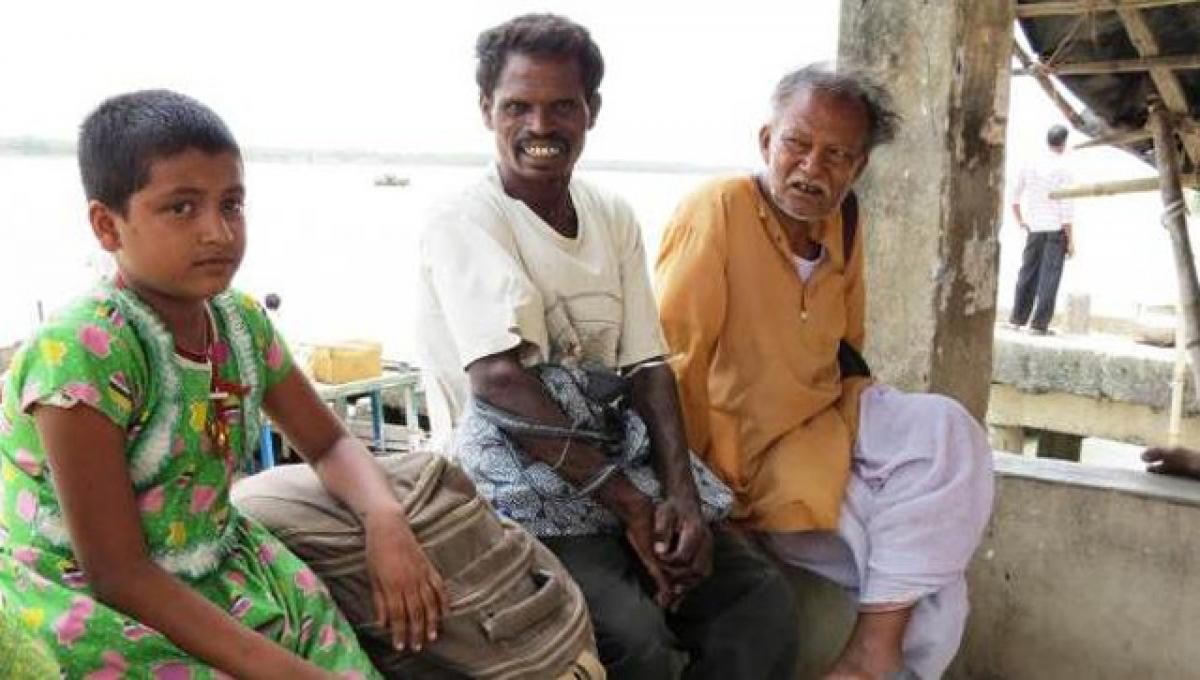Live
- 'Your efforts will shape nation's future', PM Modi wishes successful Civil Services candidates
- Biofuels firm GPS Renewables raises $50 mn from private, public sector banks
- IPL 2024: It was a game about who'll hit more sixes, says Aaron Finch on RCB's defeat against SRH
- U20 Men's Football Nationals: West Bengal seal quarter-final berth
- IPL 2024: ‘Better, they play 11 batters’, says Srikkanth after RCB bowlers leaked 287 runs against SRH
- 10,000 Palestinian women killed in Gaza: UN Women
- Trinamool again conspired to thwart Ram Navami celebrations in Bengal: PM Modi
- Death toll in flooding in Afghanistan rises to 50
- Electioneering, campaigning to end by 6 pm on Wednesday in TN: CEO
- Denmark's historic stock exchange in Copenhagen goes up in flames
Just In

New-age orphans in Sundarbans. Sandeshkhali - Eleven-year old Srijita Bhangi sits in the waiting room of the jetty boat that connects her island home in Khulna to the mainland Sundarbans, near India\'s border with Bangladesh.
Sandeshkhali - Eleven-year old Srijita Bhangi sits in the waiting room of the jetty boat that connects her island home in Khulna to the mainland Sundarbans, near India's border with Bangladesh.
.jpg)
After spending a few days with her elderly grandparents – an effort to lift her most recent spell of depression – she is travelling back to the school hostel where she has lived since her parents left two years ago to find work in a garment factory 1,000 kilometres (620 miles) away, in Tamil Nadu.
.jpg)
Since then she has seen them only once, and the school lodging has effectively become her new home. "My granddaughter is sad going back to the hostel," admits her frail 72-year-old grandfather,Nripen, who will accompany her on the journey.
"Her education has suffered since her parents left. She was in fifth grade in the village school but was demoted (to second grade) in the new school." The Sundarbans is a natural region in the Bengal region comprising Bangladesh and Eastern India.
It is the largest single block of tidal halophytic mangrove forest in the world.[2][3][4] The Sundarbans covers approximately 10,000 square kilometres (3,900 sq mi) of which 60 percent is in Bangladesh with the remainder in India.
As climate change brings sea level rise, growing salinity in water and more dangerous storm surges to the low-lying and already economically depressed Sundarbans region, a rising number of parents are migrating elsewhere in search of work, with mothers increasingly joining fathers away from home, experts say.
Most migrants hope to one day to bring their children with them. But poor accommodation near new jobs, language barriers and a lack of childcare mean few children can make the move right away.
That has led to a staggering surge in children left behind in school hostels or with elderly grandparents – and a rising epidemic of childhood depression, malnutrition and vulnerability to child trafficking, local doctors and aid workers say.
They term the left-behind children “new-age orphans". "The number of children suffering from depression has increased dramatically. We have to treat them for various mental disorders now that were unthinkable even five years ago," said Dr.Amitava Choudhury, a medical doctor who has worked in the Sundarbans for 18 years.
With parents away, child hostels are in huge demand in the region, local people say. Most – both charity-run and private – offer residential schooling. But affordability is a major concern among poor villagers. As a result, many hostels, to keep costs down, provide only basic education and safe shelter.
Another hazard facing children left behind is child trafficking. The state of West Bengal, where the Sundarbans is located, had the country’s highest rate of child trafficking in 2013, with 669 registered cases – a figure considered a gross underestimate as the crime is underreported, Das said.
With the number of children living without parents rising, having more state-run residential schools would be a huge help, said Subhas Acharya, for two decades a joint director of the Department of Sundarban Affairs and a resident of Pathar Pratima. "The land resource is finite and a population of 4.4 million cannot be sustained within it.
Fish stocks have diminished and forest dwelling involves high risks. On top, climatic changes here are already evident and well-documented," he said. But hostels and shelters can never replace the love and care of parents, warned Anshumas Das. "Even if the children live with their grandparents, they feel neglected and depressed.
These are the new-age orphans," he said. Nripen, 11-year-old Srijita's grandfather, agrees. Since his daughter and son-in-law left for work in the garment factory, Srijita has suffered bouts of depression and been held back in school, he said.
"If we die early, she will be entirely left to her own devices, a thought that scares me," he said, walking wearily to the boat that had just arrived. It was time to ferry Srijita to the other side.
By Aditya Ghosh

© 2024 Hyderabad Media House Limited/The Hans India. All rights reserved. Powered by hocalwire.com







